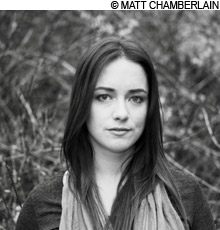
TERROR PLEASURE In Amelia Gray's first novel, one character is crazy, some are covered in wasps, and others just do too much laundry.
|
Ten years ago, I bought a copy of Ben Marcus's first novel, Notable American Women, on the recommendation of a young literary editor. As much as I wanted to have something to talk about with this person, I gave up after about 50 pages, not at all charmed by Marcus's too-clever-by-half devices (a silence cult, a possibly dead narrator) and oblique references to "language poison" and "listening cloths." What on earth was he even talking about? It simply wasn't my bag.But I should have known that. Although I love playful novels that take liberties with form — Roberto Bolaño's The Savage Detectives, say, or Elena Ferrante's The Days of Abandonment, or Heidi Julavits's The Uses of Enchantment, or Jennifer Egan's A Visit from the Goon Squad — there's something about the murk and mire of truly experimental fiction that I find distracting and somewhat bland. Real experimental fiction is so abstract, so divorced from actual human experience (cf., the rhythmic literary cubism of Gertrude Stein or the invented language of Finnegans Wake) that I find it utterly alienating and somewhat pointless even to attempt. I acutely dislike not understanding what I'm reading.
In the intervening years, I've managed to enjoy some pretty out-there short story collections, like Matthew Derby's Super Flat Times (set in a world in which all food is meat-based, even ice cream) and Amelia Gray's Museum of the Weird (where people have multiple babies overnight and men marry frozen fish and paring knives). But a short story is one thing, and a novel is a whole other kettle of frozen fish. After shelling out the cash for Tom McCarthy's recent, widely praised, high-modernist novel, C — a book about a British WW1 soldier that, according to the Guardian anyway, speaks "the language of post-humanism" — I abandoned it after four pages.
Then I read John D'Agata's snotty invective against strictly truthful nonfiction in The Lifespan of a Fact (Norton):
"I'm tired of this genre being terrorized by an unsophisticated reading public that's afraid of accidentally venturing into terrain that can't be footnoted and verified by seventeen different sources. My job is not to re-create a world that already exists, holding up a mirror to the reader's experience in hopes that it rings true. If a mirror were a sufficient means of handling human experience, I doubt that our species would have invented literature."
Was I — a person tens of thousands of dollars in debt from studying literature — missing the point? It was in this spirit of self-flagellation that I turned to new novels by Ben Marcus and Amelia Gray.
Marcus — who, at 45, is the only bona-fide experimental writer whose stories appear semi-regularly in the New Yorker — is the most commercially successful of his ilk. All three of his books have been reviewed in the New York Times Book Review. Extremely popular, populist writers like Jonathan Safran Foer say he's "necessary" in back-cover blurbs, as in, "It's become impossible to imagine the literary world — and the world itself — without his daring, mind-bending, and heartbreaking writing." And yet even Marcus, writing in Harper's, identifies the paucity of his lot. His cohort are "alien artisans, those poorly named experimental writers with no sales, little review coverage, a small readership, and the collective cultural pull of an ant."